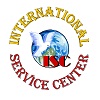CHIP Information Session
Presenter: Mr. Jason Watts, (Community Engagement & Enrollment Consultant)
Event: Children’s Health Insurance Program (CHIP)
Date: June 3, 2025
Location: International Service Center (ISC)
The International Service Center (ISC) welcomed Mr. Jason Watts, a seasoned Community Engagement & Enrollment Consultant, for a comprehensive presentation on the Children’s Health Insurance Program (CHIP). With over 17 years of experience working in health access advocacy, Mr. Watts brought deep insight into how CHIP provides accessible, affordable healthcare for children throughout Pennsylvania.

Program Overview: What Is CHIP?
CHIP is a federally funded health insurance program designed to provide medical, dental, vision, and prescription coverage for children from birth through age 19. A key takeaway from Mr. Watts’ presentation was that CHIP is not limited to low-income families—it is available to families across a broad range of incomes, depending on household size and financial need.
Eligibility Criteria
To qualify for CHIP, a child must:
- Be a resident of Pennsylvania
- Be under 19 years of age.
- Be a U.S. citizen or have lawful immigration status (including refugees and lawful permanent residents)
- Not eligible for Medical Assistance (Medicaid)
- Fall within defined income eligibility guidelines.
Note: CHIP is not available to undocumented children, but families are encouraged to apply, as each case is reviewed individually.
Cost Structure and Program Tiers
CHIP offers a tiered coverage system based on family income:
| Tier | Monthly Premium (Per Child) | Copay Details |
| Free CHIP | $0 | No copays |
| Low-Cost CHIP A | $55 | Minimal copays |
| Low-Cost CHIP B | $70 | Minimal copays |
| Low-Cost CHIP C | $80 | Minimal copays |
| Full-Cost CHIP | $332.91 | Standard copays |
Many families discover that CHIP offers significantly lower premiums than employer-sponsored insurance, which can cost upwards of $3,000 per month.
Covered Benefits
CHIP provides comprehensive health coverage for children, including:
- Preventive care and emergency medical services
- Dental exams, cleanings, and vision services (including eyeglasses)
- Mental health and substance use treatment.
- Prescription medications (generic and brand-name)
- Hearing aids and durable medical equipment
- Care coordination and chronic condition management.
Enrollment & Renewal Process
Families can enroll their children in CHIP through the following methods:
- Online via Capital Blue Cross or the state system
- Phone enrollment through CHIP helplines.
- In-person support at local County Assistance Offices or community events.
Renewal is needed annually, with reminders sent 60 and 30 days before the coverage expires. Translation help is available for families who speak Spanish, French Creole, and other languages, making the process accessible to immigrant and refugee communities.
Common Concerns Addressed
During the session, Mr. Watts answered questions on key issues, including:
- The difference between CHIP and Medicaid.
- How CHIP supports immigrant and refugee families.
- How CHIP works for children who already have dual insurance.
- Provider compatibility and how to find doctors who accept CHIP.
- Limitations for undocumented children or those with pending status.
Mr. Watts reiterated that CHIP is not a form of welfare, but a government-supported insurance program funded by taxpayers, and all eligible families have the right to use it.
Community Reach and Impact
Capital Blue Cross and the CHIP program work across twenty-one counties in Pennsylvania, enrolling more than 10,000 children. Mr. Watts and his team offer personalized support to help families:
- Complete applications.
- Understand documentation requirements.
- Resolve issues with enrollment or provider access.
Their ongoing outreach ensures that even families in rural or underserved communities are informed and empowered.
Conclusion
The session concluded with an engaging Q&A, where ISC staff and participants expressed appreciation for the clear, compassionate delivery of information. Mr. Watts’ professionalism and dedication to ensuring healthcare equality for children were deeply appreciated.
The International Service Center thanks Mr. Watts by presenting him with an appreciation certificate for his ongoing advocacy and looks forward to continued collaboration in supporting the health and well-being of all families in the community.




No Response to “CHIP Information Session”